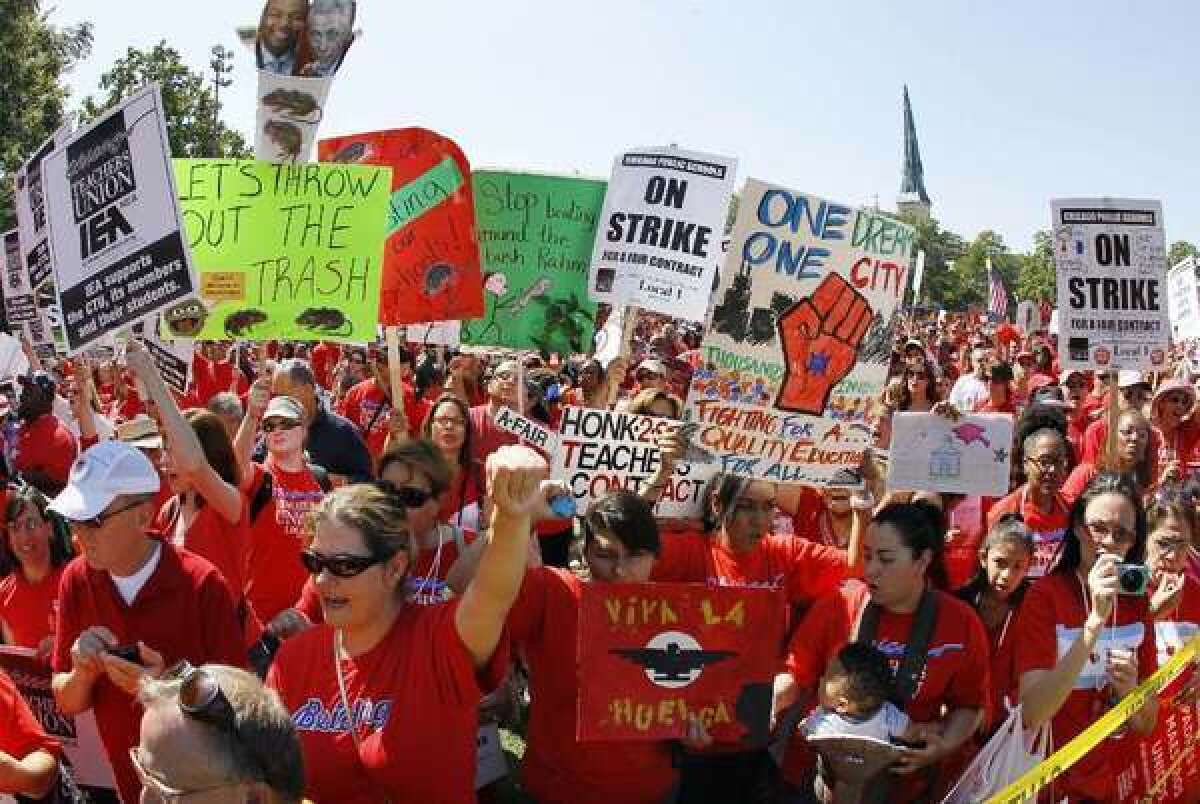Why public employees should have the right to strike

- Share via
It would take a finely tuned instrument to measure the speed with which a strike by public employees is followed by politicians calling for a ban on this fundamental right of organized labor. Sure enough, the ink wasn’t dry on the settlement ending the recent strike by workers for the Bay Area Rapid Transit system when a candidate for the State Assembly spoke up.
He’s Steve Glazer, a Democrat running for a seat in the East Bay. “Transit is an essential public service, just like police and fire,” he says. He argues that since California bans strikes by police and firefighters, transit strikes should be banned too.
That’s baloney. Glazer should just admit that he’s pandering to the voters--he’s been haunting BART stations to collect signatures for a petition to ban transit strikes--and stop trying to dress up his position as a matter of principle.
It’s worth taking a quick look at the history of public employee strikes, and how they compare to strikes in the private sector.
Only 11 states allow any public employees to strike, and most of those impose limits. The most common restriction is a ban on strikes by police and firefighters, for the perfectly legitimate reason that those walkouts pose an immediate threat to public safety.
But is that true of strikes by teachers, transit workers, DMV clerks, park rangers, or almost any other category of public worker? Their walkouts pose an economic threat, which is very different. In fact, economic threats are the very essence of a strike. After all, if labor walkouts didn’t impose hardship on the other side or on third parties like customers, who can themselves exert pressure for a settlement, there’d be no point to striking at all.
The reason that public employee strikes are outlawed in all but 11 states has nothing to do with a threat to public safety. It’s that governments are the only employers that actually have the ability to outlaw them. There isn’t an employer in the world who, given the authority, wouldn’t do the same (and cook up a threadbare rationale for how strikes in this industry would compromise public safety). Supermarket owners? Airlines? UPS? They’d all love to make strikes by their workers illegal. They just don’t have the power.
That said, public employee strikes even in those 11 states are rare. As Melissa Maynard observed in the Pew Charitable Trust’s publication Stateline, last year’s Chicago teachers strike, the most high-profile public employee walkout in recent years, was the first teachers strike in that city in 25 years and the first in a major city since a Detroit teachers strike in 2006.
The reason for the scarcity of public worker strikes has a lot to do with the dynamics of strikes in general. Employers and employees in any job action are making a calculation based on comparative hardship. Both sides sustain economic losses--the workers go without paychecks and risk losing their jobs, the employers lose income and risk losing customers, sometimes permanently. The goal is to survive the short-term economic loss while imposing greater costs on the other side, until one side or the other cries uncle.
And both sides try to enlist the sympathy and support of customers. Teamsters won a huge victory over UPS in a 15-day walkout in 1997, for example, because customers appreciated the efficiency of their UPS drivers and management looked cheap and greedy.
That’s harder for public employees to achieve, in part because their customers, the taxpayers, also see themselves as their employers. And employers always hate strikes.
But it’s not impossible. Teachers and public hospital nurses tend to have the greatest success, because often they can make the case that the services they provide are compromised by skinflint and inefficient management. Ask Arnold Schwarzenegger how his campaign against nurses turned out in 2006, when he tried to cut nurse staffing ratios in state hospitals. On the other hand, BART drivers didn’t seem to have the public foursquare on their side in the recent job action. (That’s not even counting the contempt shown the BART drivers by some overprivileged high-tech poobahs).
But there’s no basis for the claim that public employee strikes, outside police and fire services, are uniquely dangerous or injurious to the community. Candidate Glazer complains that the BART strike forced commuters to find other means of getting to work or kept them home, hobbling the local economy. Yes, that’s right. The same thing would have happened if the transit system were privately run, as it is in some places.
And strikes in any number of other private sector industries also hobble the local economy and impose hardships on some people. Milk strikes. Truck driver strikes. Telephone lineman strikes. Port strikes. Fast food worker strikes. The point in every case is not to minimize or moderate the impact, but try to stick the other side with the blame. And in that, public employees deserve no less the right than the rest of us to give it a shot.
Should public workers be allowed to walk out? Let’s hear your thoughts.
More to Read
Sign up for Essential California
The most important California stories and recommendations in your inbox every morning.
You may occasionally receive promotional content from the Los Angeles Times.










